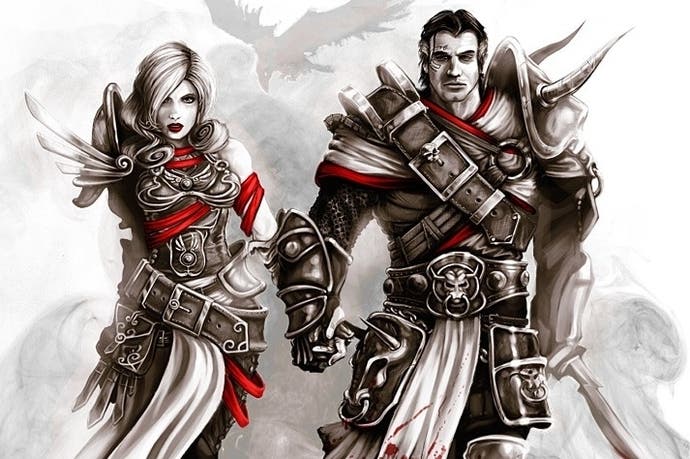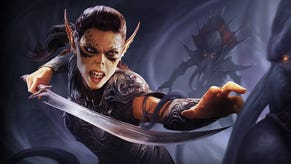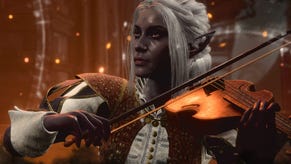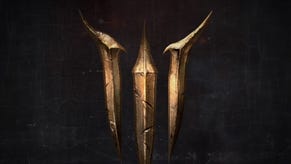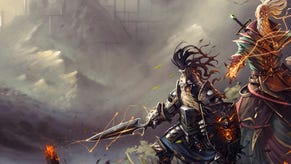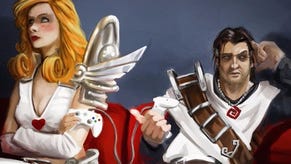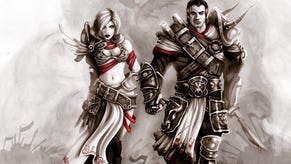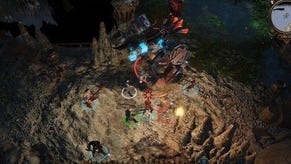Divinity: Original Sin alpha review
To adventure is human...
Divinity: Original Sin reminds me a lot of Ultima 7, and that's a Good Thing. It doesn't play like it, it doesn't particularly look like it, but it has at least a piece of that game's soul embedded at its core, throbbing with a pleasing hum.
This is something it shares with the original Divine Divinity, which won many hearts in 2002, even with its awful name. Unfortunately, to my sadness, mine wasn't one of those hearts, and the sequels fared little better on my PC. This has always been a series that I've wanted to love, both for taking inspiration from one of the best RPGs ever and for inventing an awesome new concept for each game. It's just never happened, usually due to two factors: the more mundane RPG foundations struggling to live up to the big ideas, and the design needing an editor armed with a chainsaw-machete.
But I'm really digging Original Sin. I am digging it hard enough to strike oil.
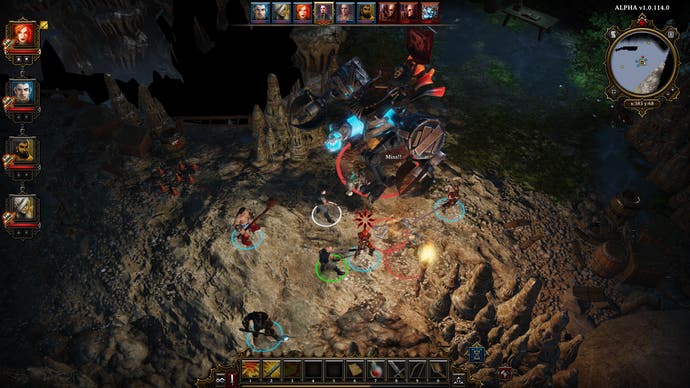
While a much more traditional game than developer Larian's last few outings, it's far from simple. Even in alpha, this is an RPG that both harnesses the studio's love of quirky ideas and channels the Ultima spirit to the point that it's a wonder chats don't open with a cheery "Name?" "Job?" or "Bye!" Certainly, making the first quest a cult-related murder investigation gives the opening town a distinct Trinsician quality - and yes, you can indeed bake bread. Add water to flour, put the dough in the oven, wait, and presto, one yummy roll. (Though as when running Ultima in the Exult engine, there's no way to do it with a bucket of a dead man's blood and then feed the result to his newly orphaned son. Yet.)
Original Sin is very much its own RPG too, familiar and fresh in the way of a modern successor rather than a mere tribute act. The obvious place to start would be with the element-driven combat system, or perhaps the co-op system - but everyone's going to do that, so instead I'm going to tell you how I stole someone's smelly panties. For professional purposes, clearly.
It was part of that murder investigation, which has at least one other solution. Mine was best, though, because it involved talking to a dog. That wouldn't normally do a lot, but with the right perk Original Sin lets you converse with it too, and that's much more useful. In fact, you can chat with all the animals that aren't trying to kill you, and most of them have funny dialogue: a pampered house-cat, an arrogant rooster, a pig writing a novel it hopes will change the world, a crab who desperately wants to be your friend... I recommend this perk highly, even if it does mean forgoing something dull like 'staying alive'.
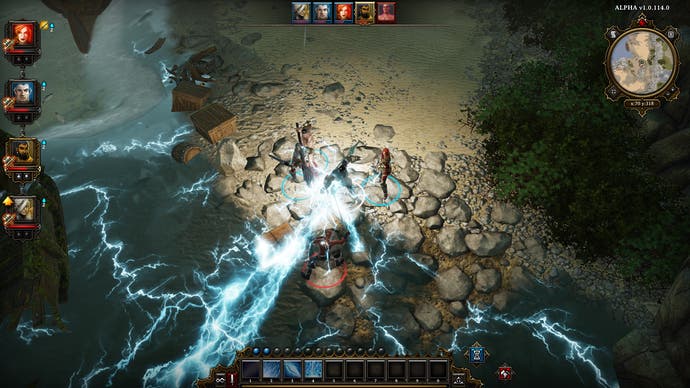
In this case, however, it had a practical purpose, the dog being willing to help the investigation by lending his nose and telling me if he sniffed anything suspicious on the suspects' items. Stealing is easy, though the NPCs start hating you if you so much as touch their stuff - or in fact, anyone's stuff - up to and including the books on public library shelves. By distracting them with one character then having another go sneaky, it's possible to completely roll over their houses while they stare away, obliviously.
Getting through locked doors was trickier, none of the party being thieves by trade. I did however have a warrior willing to abuse the oh-man-is-this-going-to-be-patched-hard "Phoenix Dive" skill that is technically for getting into the fray mid-combat, but which turned out to be an effective way of blinking into sealed rooms in search of incriminating underoos. In the end, these blatant violations of heroism didn't help me find the target directly - or at least not with any evidence that should ever be presented in a court of law (even discounting the 'talking dog' thing) - but they did rule out three of the suspects and make it clear who to turn the party's full attention on.
This was a pretty good intro for the game, and not the only big choice to make in Original Sin: there's signing up to a guild that sounds more like a pyramid scheme than an adventuring institution, for instance, or mediating between a librarian orc and a vengeful elf. The writing isn't at a Planescape or even a Dragon Age level, but it's well done and full of character. Just about every big player in the story has some quirk, including a wizard who prefers to be a cat, a hard-of-hearing town mayor and a recruitable henchwoman who spends her whole time spitting at magic and magic users... except for when the magic is saving her arse, obviously. Chatting is never dull, though figuring out what plot trigger the characters are waiting for can be - especially with such a big, unlabelled map to hunt through. Semi-related: all RPG characters need to learn the line, "Right, but where is that EXACTLY?"
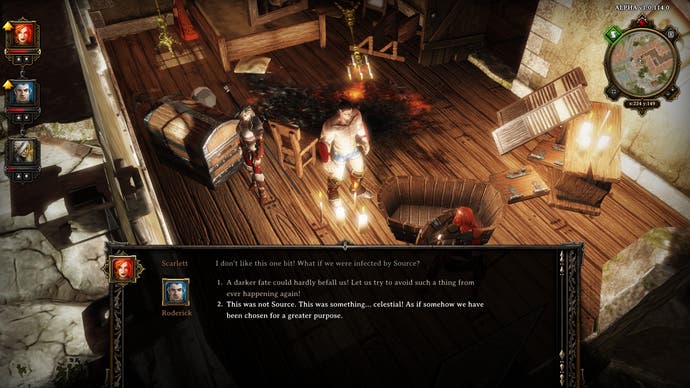
One of Original Sin's cleverest additions is that you don't have one main character, but two. In co-op, the second is played by another person. Even solo, it's possible to debate issues between the two and role-play moral decisions to acquire traits and make them seem more like individuals.
Right now, there aren't many character creation choices, with both the characters' names and genders pre-assigned, but that's due to change. Things quickly improve once in the world, with plenty of skills and spells to learn, and initial character classes providing more of a preset build than a template. Just to ring the changes, I decided to make the lady on the team the frontline Warrior with a sword and board, and the guy the squishy Wizard, at which point Original Sin promptly declared Hero Gender Equality Day by refusing to draw his robe and making him spend the whole alpha in his pants. It may not be every heroine's revenge for enduring years trapped in chainmail bikinis, but it's a start.
Luckily, the stats on said robe worked fine, so this didn't get in the way of combat. Even luckier, combat is really entertaining. Fights switch to a turn-based system that can mostly be summed up as 'working well', with the range of tactical options increasing as the party grows. Magic, for instance, doesn't use mana, but a system of cooldowns where bigger spells take turns to become available again, but basic ones are always on hand if you have enough Action Points. It's possible to save points for more choice next round, or to save up for big attacks, but generally everyone on the team gets to cut loose and contribute every turn of every fight, rather than running dry on mana or stamina and just becoming a liability.
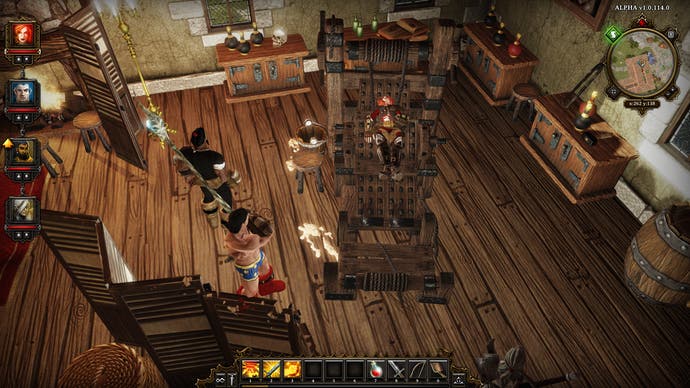
For magic users, much of this involves juggling elements: skills like setting the ground on fire to deal damage to anyone standing on it, or creating a puddle of water out of rain and hitting it with a lightning bolt or with ice to create a slippery deathtrap. These skills can be used out of combat too, notably to put out the flames on a ship and to de-trap a chest, but it's in combat they're most useful, especially when thinning a large herd. They're already fun to play with and offer lots of potential for widening Original Sin's later scope. Hopefully they'll keep getting use in non-combat situations, too.
There are definite frustrations in the current build, including the inevitable bugs and a fair amount of repeated dialogue; an endearing combination came in one big fight where the villains suddenly lost their combat flags and started talking like generic townsfolk, demanding to know what kind of monster could be behind their own evil plan, currently in progress. Other areas could definitely do with a spit-polish, such as better labelling and quest pointers, and a refinement of the property system. Right now it appears to work by assigning any stealable item to whoever is closest, which gets really silly in busy areas like the library.
These are the kind of issues to be expected in an alpha RPG though, and for the most part Original Sin is both playable and shaping up solidly. As an Early Access purchase specifically, it's difficult to recommend - but that's more down to what it is than what it does. Narrative games in general deserve to be seen when all the pieces are in place and without your saves getting nuked with every patch. That said, if you don't mind these factors, this is a satisfying chunk of the early game that offers about 10-15 hours worth of sneak-peek without spoiling too much, and with enough flexibility that a second run won't be a big hardship.
While it remains to be seen whether Original Sin manages to be the Ultima successor that both Larian and I want it to be, it's in with a fighting chance. Much rests on how it develops its elemental mechanics and main storyline, and if and how decisions you make come to influence what comes later. So far, it's the best attempt I've played in a long while, and one that offers plenty of hope that Larian can pull it off. Certainly, it's the first Divinity game that has hooked me in like I've wanted since the series began, to the point that I feel sad that - rough as it inevitably is - it's only a slice of the game. That's a great start for a RPG with big ambitions, and I eagerly look forward to continuing the quest in the spring.
Eurogamer's alpha and beta reviews are reviews of games that are still in development but are already being offered for sale or funded by micro-transactions. They offer a preliminary verdict but have no score attached. For more information, read our editor's blog.
